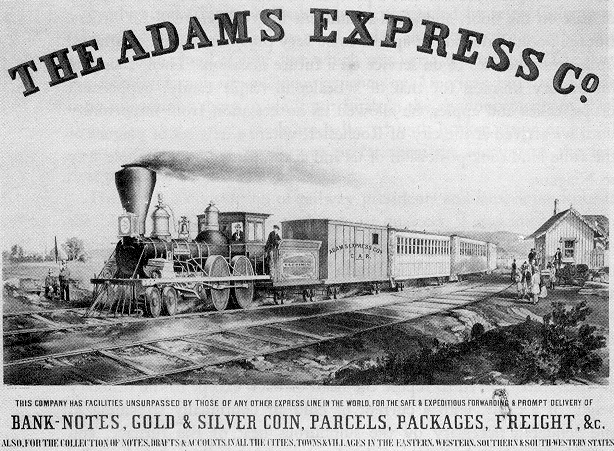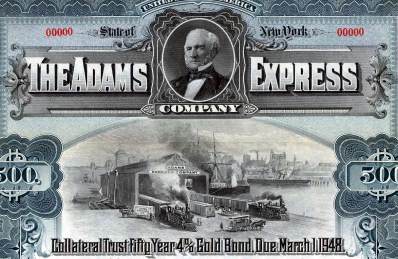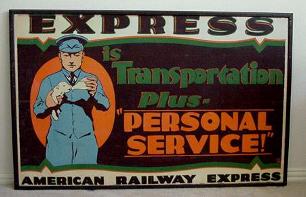The Express Companies
The business of delivering things originated in 1839 with William Harndon, who personally carried packages � generally legal documents � between New York and Boston. Within a year Alvin Adams had begun personal delivery of securities, documents, and parcels between the financial centers of Boston and New York. Adams went through a succession of partners, and expanded his business, but nevertheless limited it to New York, New London, Norwich, Worcester, and Boston. A large number of local and regional companies were begun during the ensuing years, including Livingston, Fargo & Company, Wells & Company, and Butterfield & Wasson, founded by such well-known personages as William Fargo, Henry Wells and John Butterfield. These individuals organized the American Express Company in 1849 at Buffalo, NY. Fargo became its President, with Wells was Secretary.
By 1854 there were a number of local and regional express companies in the eastern states. That year, Adams & Company, Harnden & Company, Thompson & Company, and Kinsley & Company merged and incorporated as the Adams Express Company, with Alvin Adams as President. (Apparently the Harnden portion of the Adams Express business operations retained its company name as late as 1871.)
In 1913, the United States enacted the Parcel Post law, which enabled the U. S. mail system to carry small packages as ordinary mail, which was a serious blow to the express companies' profitability, putting a number out of business. In 1916 the following railroads at Denver Union Terminal had contracts with the following express companies:
During the 1st World War, the government nationalized both the railroads and the express companies in order to expedite the movement of goods around the country. After the war, the railroad industry took a strong interest in the delivery business and bought out the express companies. On 1 July 1918, the United States Railroad Administration (USRA) consolidated the main companies -- Wells Fargo, Adams Express, American Express, et al. into a new company called the American Railway Express Agency. All the stock of the other companies was held in trust and operations were combined to facilitate the war effort. In March 1920, control was given back to the "other" companies, but ARE was not split up. In March 1929, ARE was reorganized with the railroads owning 86% of the stock which was bought by them from ARE. Thus began the Railway Express Agency, Inc. In September 1927, the Air Express division was started. In 1960, a group of company officials obtained the stock from the railroads and changed the name to REA Express. Due to demise of passenger service, this company went bankrupt in 1975. ADAMS EXPRESS COMPANYAdams Express had its beginnings in 1840, when 36 year old Alvin Adams (1804-1877) began personal delivery of securities, documents, and parcels between the financial centers of Boston and New York. Adams took in Ephraim Farnsworth as a partner to run his New York office, and on Farnsworth's death took in William Dinsmore as partner. They expanded their business, but nevertheless limited it to New York, New London, Norwich, Worcester, and Boston. During its early years it was known as Adams & Company's Express, Adams & Company and Adams Package Express (probably coincident with the various partnerships). In 1854, the business was incorporated as the Adams Express Company, consolidating Adams & Company, Harnden & Company, Thompson & Company, and Kinsley & Company, with Alvin Adams as President. (Apparently the Harnden portion of Adams Express business operations retained its company name as late as 1871.)
Following its incorporation, the company expanded rapidly, first through the south and southwest, and in 1870 to the west coast. It was soon one of the "big three" among the express companies, Wells Fargo and American Express being the others. By the 1880s, the Company had nearly 8,000 employees, was operating over 20,000 miles of railroad track, and had offices all around the United States and in most of the major cities in Europe. On 1 July 1918, the United States Railroad Administration (USRA) consolidated the main companies -- Wells Fargo, Adams Express, American Express, et al. into a new company called the American Railway Express Agency. All the stock of the other companies was held in trust and operations were combined to facilitate the war effort. In March 1920, control was given back to the "other" companies, but ARE was not split up.
Today, the Adams Express Company is a diversified equity investment company. According to their website:
AMERICAN EXPRESS COMPANYThe American Express Company began in 1849, at Buffalo, NY, when John Butterfield ( ? - ? ), William Fargo ( ? - ? ) and and Henry Wells ( ? - ? ) organized a company to deliver express, primarily in the eastern part of the country. Fargo became its President, while Wells was its Secretary. (Merging the Livingston, Fargo and Company, the Wells and Co., and the Butterfield and Wasson express operations?) But the California gold rush almost immediately made California the place to make money, and the same individuals in 1852 formed Wells, Fargo & Company to operate in California, operating stage coaches and providing banking services. In 1857, John Butterfield and Ben Holliday ( ? - ? ) formed the Overland Mail Company. In 1866, Wells Fargo bought the other (?) stage lines and was in complete control of the stage and banking business in the far west. "Treaty" of Omaha" signed October 1869 giving the express co. the needed contracts for operation on the trains. American Express Company continued to operate in the east and in time expanded westward. (From December 1, 1868 to January 31, 1873 this company and its proprietors became the American Merchants Union Express after merging with their competitor Merchants Union Express Co. After this time the companmy again became the American Express Company.) Bought Pacific Express 1914 (result of 1913 Parcel Post Law) On 1 July 1918, the United States Railroad Administration (USRA) consolidated the main companies -- Wells Fargo, Adams Express, American Express, et al. into a new company called the American Railway Express Agency. All the stock of the other companies was held in trust and operations were combined to facilitate the war effort. In March 1920, control was given back to the "other" companies, but ARE was not split up. American Express continued in banking and today issues "the CARD." AMERICAN RAILWAY EXPRESS AGENCYOn 1 July 1918, the United States Railroad Administration (USRA) consolidated the main companies -- Wells Fargo, Adams Express, American Express, et al. into a new company called the American Railway Express Agency. All the stock of the other companies was held in trust and operations were combined to facilitate the war effort. In March 1920, control was given back to the "other" companies, but ARE was not split up.
In March 1929, ARE was reorganized with the railroads owning 86% of the stock which was bought by them from ARE. Thus began the Railway Express Agency, Inc. DENVER & RIO GRANDE EXPRESS COMPANY1880-1903 Regional company operating on D&RG trains 30 September 1903 taken over by Globe Express Company (still owned by Rio Grande interests) GLOBE EXPRESS COMPANYOwned by Rio Grande interests 30 September 1903 took over by Denver & Rio Grande Express Company HARNDEN EXPRESS CO.1839-1854 Operated in the eastern states and overseas. Established by William S. Harnden in March 1839. Absorbed by the Adams Express Co. on July 1, 1854, but the Harnden portion of Adams Express business operations retained its company name to as late as 1871. Also known as Harnden's Express and Harnden & Co's Express. NORTHWESTERN EXPRESS CO.1854-63? Regional parcel express company, Northern Iowa and Minnesota PACIFIC EXPRESS1879-1911or1913 Regional private mail and package express company operating primarily west of the Mississippi Formed from the Kansas Pacific and Union Pacific Express Companies and developed a strong business liaison with the United States Express Company to provide trans-continental express service. Liquidated late in 1911 when Wells Fargo & Co. took over its remaining
express routes? PEOPLE'S DISPATCH COMPANYRegional package express company operating Washington, DC to Boston, MA POMEROY & CO'S EXPRESS1841-1844 Regional private mail and parcel express company operating in NY state and into Canada Founded by George E. Pomeroy Succeeded by Livingston, Wells & Pomeroy Express PULLEN, VIRGIL & CO'S EXPRESS1844-1854? Regional private mail and parcel(?) express company that operated between NYC, Montreal, and Quebec. RAILWAY EXPRESS AGENCY, INC.The Railway Express Agency, Inc. began in March 1929 when the government reorganized the American Railway Express Agency, which had been formed to facilitate the war effort during the 1st World War. In September 1927, the Air Express division was started. In 1960, a group of company officials obtained the stock from the railroads and changed the name to REA Express. Due to demise of passenger service, this company went bankrupt in 1975. UNION PACIFIC EXPRESSowned by U.P. UNITED STATES EXPRESS COMPANYstarted 1854 ceased operation 1914 due to Parcel Post Law WELLS, FARGO & COMPANY EXPRESS1852-1918+ Under the control of the E.H. Harriman by 1905. He sold the banking interests in California. (Wells Fargo Bank???) On 1 July 1918, the United States Railroad Administration (USRA) consolidated the main companies -- Wells Fargo, Adams Express, American Express, et al. into a new company called the American Railway Express Agency. All the stock of the other companies was held in trust and operations were combined to facilitate the war effort. In March 1920, control was given back to the "other" companies, but ARE was not split up. ("Transcontinental private mail and package express company that was started on March 18, 1852 in New York by Henry Wells and William G. Fargo. The intended operating area of this express company was the California coast and gold fields and it began its express business in California later in 1852. Wells, Fargo & Co.'s Express quickly expanded throughout California and gradually acquired other express companies and railroad express contracts until it achieved true transcontinental coverage on March 16, 1888. It became one of the four largest U.S. express companies ever, and perhaps it alone was the biggest in U.S. history. The official business name was changed to Wells Fargo & Company Express in 1898. The U.S. package express business portion of this company subsequently ended and was absorbed by the American Railway Express Co. on July 1,1918 by federal proclamation. However, Wells Fargo continued with their express business in Mexico into the 1940's. The Wells Fargo banking operations that was started in the 19th century also continued to prosper after 1918 and this institution is still going strong today.") For More Information �Fradkin, Philip L. Stagecoach: Wells Fargo and the American West. New York, NY: Free Press/Simon & Schuster, 2001. Beebe, Lucius and Charles Clegg. U.S. West; The Saga of Wells Fargo. New York, NY: E.P. Dutton, 1949 Jackson, W. Turrentine. Wells Fargo in Colorado Territory (Colorado Historical Society Monograph Series, No. 1). Denver, CO: Colorado Historical Society, 1982. Nevin, David. The Expressmen. New York, NY: Time-Life Books, 1974.
Stimson, A.L. History of the Express Companies; and the Origin of American Railroads. New York, NY: Privately Published, 1858 (40 pp), 1859 (287 pp); New York, NY: Baker & Goodwin, 1881 (288 pp). (Very, very expensive) Roseman, V. S. Model Railroading�s Guide to Railway Express Agency. Denver, CO: Rocky Mountain Publishing Co., 1993. National Museum of American History (Smithsonian Institution) �
|


